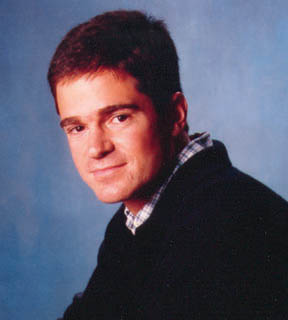|
Web Exclusives: PawPlus
C.W. Tooke'98 takes on professional baseball in his first novel, Ballpark Blues (Doubleday). Tooke, a former editor for PAW who also has written for Salon and New Jersey Monthly, tells the story of Russ Bryant, a young sports writer who has lost his love for the game until a baseball-playing phenom, Casey Fox, enters his life and jump starts Bryant's career and social life. Tooke says it's no mistake that readers end up knowing what Russ, the book's narrator, thinks. "There's long been an idea in American fiction that, god forbid, you have a central thesis that is explicit, as opposed to being realized through dramatic action," says Tooke, who traveled the country this spring publicizing the book. "The classic piece of American fiction over the last 20 years is the sprawling, rambling, family novel/memoir-type, and I don't have any interest at all in that type of fiction. That's why Russ ends up having more of a point of view than I think most first-person narrators would." Here he speaks with PAW. Russ is basically the person I was afraid I'd become if I went to work for a newspaper and became a sports journalist. Casey is the athlete I'd always wished I'd run into as a writer — someone who is self-aware and interesting enough to have something intelligent to say about his environment. And honest enough to be able to share that with a reporter . . . which means he is obviously a complete creation of fantasy. How much of you is in Russ Bryant? In fiction you have to find enough of yourself in the person you are writing about to be able to do it authentically. The character has to have qualities you can empathize with. Particularly if you're writing a first book and you're using a first-person narrator. Russ's worldview is more cynical than mine . . . at least I hope it is. But his core attitude toward sports is very similar to mine. Was Casey too good to be true for your editor? I think if I'd been publishing with a company that specialized in sports books, or if I'd been working with an editor at Sports Illustrated, everyone would've had difficulty believing in Casey. But at my publisher's, which doesn't handle much sports fiction, no one had that problem As far as I can tell, you got the atmosphere of the locker room down pat, as well as the relationship the media has with athletes in Boston. There was a fair amount of research involved. And a lot of it comes from having grown up in Boston and having spent my life plugged into Channel 38 watching the Red Sox. I grew up in the atmosphere, so it was more a matter of capturing it then figuring out what it was. You're a diehard Boston Red Sox fan. What's been the reaction from others? A lot of Red Sox fans have come up and said, 'As long as you're writing a novel, why couldn't you at least let them win the f***king thing?' They'd laugh, and I'd always say, 'I didn't want to blow all my credibility at the end.' Is this your first book? I wrote a coming-of-age novel, which, like most, was incredibly self-indulgent, rambling, poorly constructed, and under-invented. So it is sitting in my desk never to be seen by anybody else ever again. Tell me about your book tour? I'm glad it's over, but it's interesting to try and sell a book at the grass roots level. Reporters have to go out and meet people, and be social and be an active part of society. But as a writer of novels, you crawl into your hole and live in this nice sheltered, little world that you've constructed, which suits my personality fairly well. It's kind of a culture shock to have to be social and meet people. It takes some gearing up, but it's been enjoyable. What was it like promoting the book in your native New England? I really enjoyed the cross-promotions we did with several independent minor league baseball teams. One in particular was the Nashua Pride, managed by Butch Hopson, who was the manager of the Red Sox and one of my childhood half-heroes. You never expect in your life to be standing at a book signing in Nashua, New Hampshire, with Butch Hobson on one side of you, and a six-and-a-half-foot stuffed moose on the other — the Nashua Pride mascot. That was a proud moment for my writing, and Princeton, I think.
By A.D.
|

 June
4, 2003:
June
4, 2003: